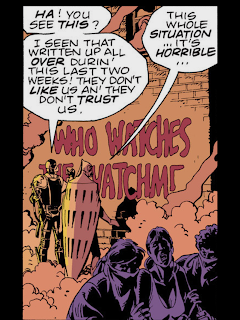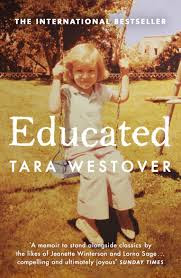Watchmen was one of the first classic graphic novels, originally published in DC comic books in 1986 and 1987, and as a single volume in 1987. I needed to read a graphic novel for a book bingo, and I found this book by going to Amazon and browsing graphic novels - it came up as the top hit because it has just been made into a TV series by HBO. I was interested not because of the TV series, but because I recognised the name of Alan Moore as the creator (along with David Lloyd) of the graphic novel V for Vendetta. I have taught the film of V for Vendetta many times to my senior students and had previously read the original graphic novel for background.
Watchmen is quite a dark and satirical look at US society, human nature, and the whole 'masked avenger/superhero' trope. It is set in an alternate timeline where America won the Vietnam War and Nixon is still President, having altered the constitution to allow himself to run for a third term. Watergate was never exposed: there is a throwaway mention somewhere about Woodward and Bernstein being found dead in a garage and "What's with that?" Masked avengers, aka vigilantes, became a big thing in society in the 1940s and 1950s. But then public opinion turned against them, and in 1977 vigilantes were outlawed. At the time the story is set, in the 1980s, the masked avengers have either unmasked and 'gone straight' or are deep underground. The title of the novel comes from the Latin tag by Juvenal: Quis custodiet ipsos custodes? - usually translated as 'Who will guard the guardians?' or 'Who will watch the watchmen?'
The novel is a complex of interwoven stories: the main plot centres around the fact that someone appears to be killing off all the old masked avengers. The main characters are the ex-avengers such as Dr Manhattan, Nite Owl, Rorschach, etc. Gradually, we learn their backstories and the complex reasons why they decided to dress up in costumes and roam the night seeking justice. We learn that their actions have often been questionable. As the avengers are disposed of, the Cold War (still going!) heats up and we get closer to nuclear war:

There are also sub-plots revolving around minor characters who act as vox populi (similar to V for Vendetta) giving the voice of public opinion. An entire sub-plot revolves around a boy reading a comic book called Tales of the Black Freighter, sitting against a fire hydrant next to a newsstand. Without giving spoilers, that story acts as a foil to the main plot, and is skillfully juxtaposed with the main story.
The novel is full of allusions to historical and political events, films, and other texts. It is also quite brutal in places, being explicitly violent and including an attempted rape. The underlying themes are around the morality of seeking justice outside the law, the human condition, war, greed, etc, so it is pretty deep. Interspersed with the main comic strip are 'excerpts' from Nite Owl's autobiography, scholarly articles on vigilantes, newspaper articles, etc.
It was interesting to see that some of the themes were ones which were also central to V for Vendetta, such as 'One man's terrorist is another man's freedom fighter' and 'Is it justified to break the law if you feel the law is unjust?' As someone who participated in civil disobedience and broke the law to protest against NZ playing sport with South Africa in the days of Apartheid, this latter question has always been close to my heart. To me, there is a difference between peaceful protest and taking the law into your own hands. The masked avengers in this novel often go beyond the original Batman trope of 'Biff!' 'Whack!' 'Tie them up and deliver them to the police', to simply killing those they believe to be evil-doers. What if they are wrong? And who gave them the right to judge? I look at the current popularity of the Jack Reacher novels (a vigilante if ever there was one) and compare those to the superheroes and masked avengers. I see that there is a strong thread in American society (perhaps in humanity as a whole, even going back to Robin Hood), which applauds the person who will take action to seek justice when the powers that be are not doing so. Watchmen reminds us that there are significant moral dangers attached to this romanticised viewpoint.
If you are interested in the themes then you will probably find this a fascinating read, but likely not a comfortable one. I did feel that it would benefit from a re-reading, a bit like the kid reading the comic book story:
By the way, speaking of morality, you may be interested in finding out why Alan Moore is not going to be watching the HBO TV series based on his graphic novel:
Article: Why Alan Moore wants nothing to do with HBO's Watchmen.














